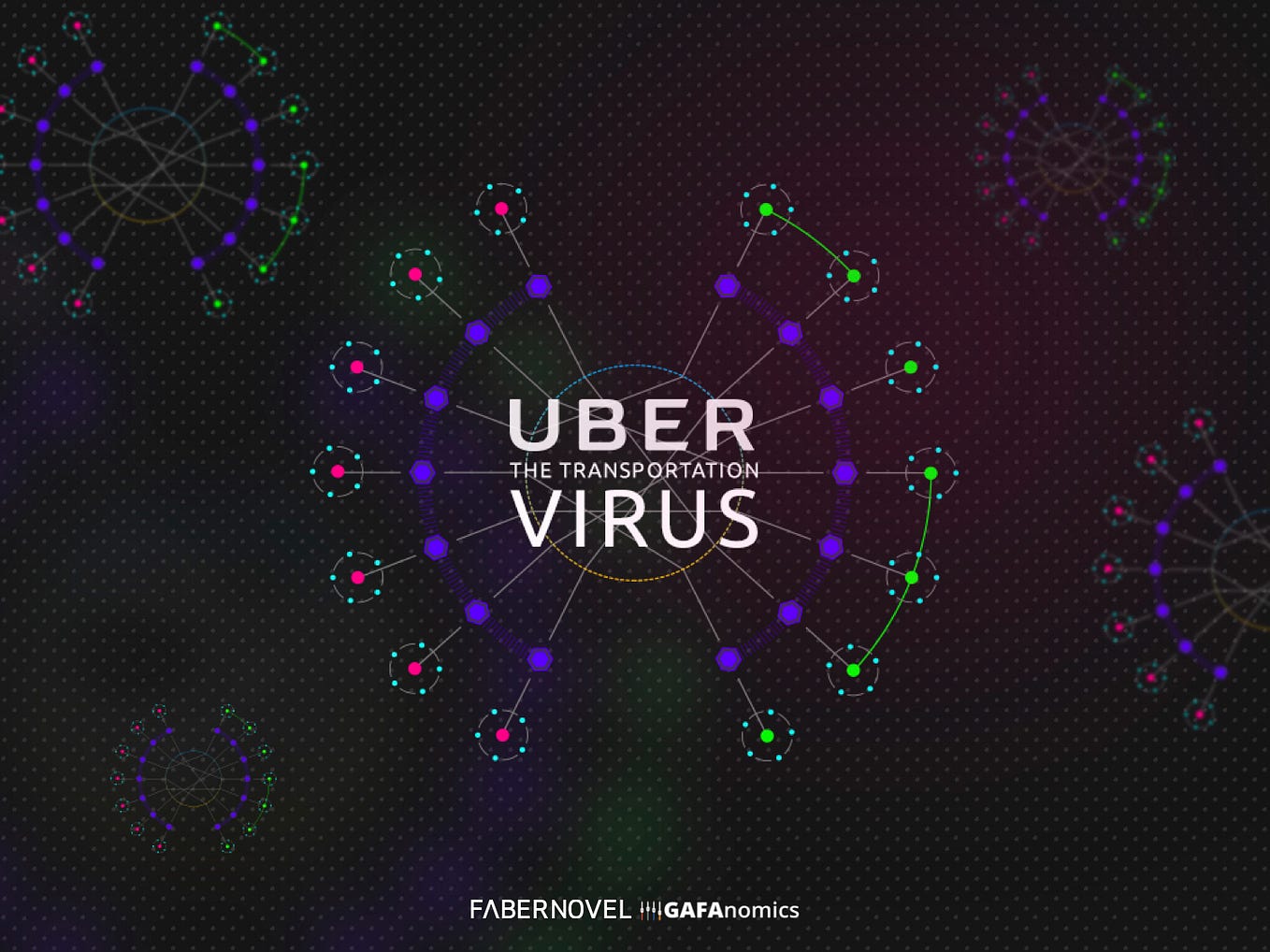
Read the full presentation on Slideshare
GAFAnomics: A new economy wrapping the planet (Part 1)


·
Follow
Published in
·
4 min read
·
Jan 26, 2016
34
This is Part 1 of a four article analysis on the network economy by FABERNOVEL, adapted from GAFAnomics Season 2 by our analyst Kevin Echraghi. You can jump to: Part 2, Part 3 or Part 4.
GAFAnomics [ga-fɑː-nom-iks], noun:A modern, networked, economic system spurred by the eponymic GAFA (Google, Amazon, Facebook, Apple) but also encompassing Unicorns, Chinese tech giants and all other companies changing our lives through computer technology.
This year has been an all time high for the fantastic 4 of the tech industry: Google, Amazon, Facebook and Apple (GAFA). Facebook grew bigger than China with 1,55Bn users while Amazon became the most valued retailer in the world, leaving Walmart behind. Apple and Google, the two most valuable brands on the planet, are pursuing their ascension, preempting markets one after the other.
The economic shift we’re witnessing gets even clearer when we look at GAFA’s aggregate performance: this year, for the first time, the combined market cap of GAFA has surpassed the old empire’s index. The new giants, from all of their 20 years of age in average, are valued $200Bn higher than the CAC40, composed of the 40 most valued companies on the French Stock Market, among which the pharmaceutical giant Sanofi, one of the most renowned beauty brand in the world, L’Oréal, or the leading commercial aircraft manufacturer, Airbus. GAFA have become industrial giants of a new economy, with its own rules and its own market mechanisms: we call them GAFAnomics, or “rules of GAFA”.
After decades of growth, this economy finally seems to have reached maturity. Indicators include:
- The creation of Alphabet, result of the classical “Legacy VS new businesses” dilemma now preoccupying the not-so-young Google.
- GAFA’s difficulties to innovate in an ever increasing competition (with failures like Google Glass, Google+, Amazon Fire Phone, or Facebook Home). .
- GAFA’s fight for market shares and not growth points anymore, as shown by Apple’s hit at Google’s business with iOS8's adblockers or Amazon’s decision to forbid the sales of Google Chromecast and Apple TV on its platform. Seems like this world ain’t big enough for 4 sheriffs!
The time of easy innovation seems definitely finished
Another hint at the existence of this new economy is the commoditization of GAFA’s model: GAFA are facing an increasing competition from all around the world, be it from China (with Alibaba, Baidu, Tencent and Xiaomi) or from Russia, Japan, Korea and India with their homegrown GAFA clones.

Moreover, we’re seeing a new breed of companies draw upon GAFA’s legacy to invade our lives and accelerate this GAFAnomics economy. Some are still privately owned, the now famous « Unicorns », others have taken the next step and entered the stock market. A few names immediately come to mind: Netflix, Airbnb, Tesla and Uber, make up NATU, the new « à la mode » acronym. With their accelerated metabolisms, these new players have taken the economy to a whole new level: it took Snapchat only 18 months to reach a $1Bn valuation when it took Google 8 full years, and 20 years on average for a Fortune 500 company! This explosive growth explains why last year GAFA’s cash could buy all of the 42 Unicorns whereas this year they can only buy the 3 first ones of this growing club of 119 Unicorns.

In average, unicorns reach a $1B valuation within 18 months — Source: Exponential Organizations (by Salim Ismail)
But, despite appearances, let’s not assume these new comers are threatening GAFA’s supremacy. They built their success on top of GAFA’s infrastructure, and wouldn’t have achieved such growth if it wasn’t for the services laid out by their predecessors.
Think of Uber. How does it distribute its products (its app)? Through the AppStore, the Play Store and most recently Facebook Messenger. How does it store and manage data? It all started with Amazon Web Services… And most importantly, how does it geolocate travelers and cars? How does it provide navigation services? Through Google Maps of course! Do the same exercise with any Unicorn you can think of, and you’ll see they’re all relying on GAFA’s infrastructures to run their businesses. Like foster-mothers, GAFA have spawned and nurtured an ever expanding digital playground.
All these indicators point out to the same direction: GAFA and their successors belong to a new economy, with its own rules and its own dynamic. A mature, commoditized, accelerating and growing economy. Actors of this new economy, the GAFAnomics companies, are reshuffling the cards, going after and defeating long-lasting industrial empires one after the other. Leaders of traditional companies need to understand the mechanisms at play and the unique structure of these new actors to plan for the future.
So what is at the core of these new businesses? How can they grow so fast?
Spoiler alert: GAFAnomics® companies all exhibit one very specific structure — they’re networks. Read part II
Read part II to dive deeper in the network economy:
GAFAnomics Companies Operate as Networks (Part 2)This is Part 2 of a four article analysis on the network economy by FABERNOVEL, adapted from GAFAnomics Season 2 by our… medium.com
Or browse GAFAnomics Season 2 on Slideshare:
34

Published in Inside GAFAnomics®
Studies, Frameworks and Opinions on the Network Economy by the innovation agency FABERNOVEL.
Follow

Written by FABERNOVEL INNOVATE
We craft the future of your Industry. At Startup Speed. FABERNOVEL INNOVATE is an Innovation Agency with offices in Paris, San Francisco, Lisbon, NY.
Follow
No responses yet
Raphaël Thys
What are your thoughts?
Cancel
Respond
Respond
More from FABERNOVEL INNOVATE and Inside GAFAnomics®


In
by
Jan 26, 2016


In
by
Jul 12, 2016


In
by
Dec 13, 2016


In
by
Jan 26, 2016
See all from FABERNOVEL INNOVATE
See all from Inside GAFAnomics®
Recommended from Medium


In
by
Sep 15


Oct 30
Lists





Natural Language Processing1871 stories·1493 saves




AI Is Killing CodingThere’s a new IDE out called Cursor. Although as I said before:
Dec 9


Oct 26


In
by
4d ago

Jul 9